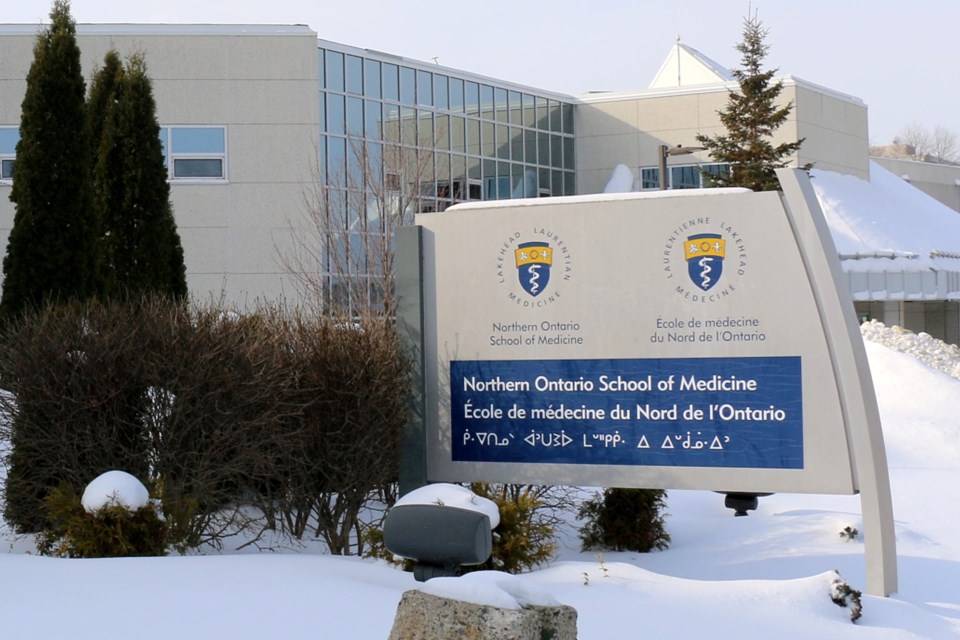NOSM University is about to launch the 2024 president's lecture series, which will focus on the importance of new medical students choosing family medicine as their specialty.
An online news conference was held Wednesday to promote the annual event, which is led by NOSM students. The lectures will be held Thursday evening online.
Dr. Sarita Verma, the president, vice-chancellor, dean and CEO at NOSM U said the lecture series is directed at medical students, predominantly those in their third and fourth year, and helping them make decisions about their career choices.
Verma said it is her belief, and the position at NOSM, that family medicine is a valid and much needed medical choice.
"I'm really excited about this because as you know, there is a challenge with physician shortages in Northern Ontario," Verma told the online event.
"We are short 360 physicians at present. And in fact, when you look at the data, maybe in Toronto with a population of three million, they're short 300 docs. So that's one in 10,000. But in Northern Ontario with a population of 850,000, the ratio is almost two-and-a-half per 10,000. So our problems are a little worse, in fact dramatically worse in the North," Verma said.
"The majority of physicians that we are lacking are family physicians. However, the reality is that at NOSM University, our university is very successful in producing family physicians. Close to 50 per cent of our graduating class usually chooses family medicine as a career compared to 30 per cent in the rest of the country's medical schools," Verma said.
Her sentiments were endorsed by Dryden family physician Dr. Adam Moir, a graduate of NOSM U, who said he has been inspired in recent years by the many medical learners who have spent part of the learning period in Dryden as they make plans to become family doctors.
"And I think if we, as a physician community, look to medical learners for their strength, look for their joy, look for the passion that they're having in medicine, I think family medicine specifically has a really bright future," said Moir.
One of the questions put to the speakers was whether anything can be done to entice new family physicians to specific communities. Reference was made to Sault Ste. Marie where it was recently revealed that physician retirements will likely force the Group Health Centre in that city to eliminate up to 10,000 patients from its roster.
Verma responded that enticements might occur for physicians who like to work in a community for a variety of good reasons.
"So it really comes down to what is the community commitment to attracting physicians to their community. But there's no way that we can actually force people to go into a community because it's their choice. And how they choose family medicine, well, I'm pleased to say here (NOSM U), they love it," said Verma.
Moir told the news conference that when he was a NOSM student, it was positive experiences and early exposure to family medicine work that convinced him to pursue that branch of medicine.
"So when I was in second year, I went to Terrace Bay, Ontario. I saw the doctors you know, resuscitating a DKA (Diabetic ketoacidosis), working in the office and delivering babies. So they did everything. And from that minute on, I decided I was going to do rural family medicine," said Moir.
"So I think the structure of having early exposure to really positive family medicine experiences is the key and trying to, you know, at least give family medicine a viable option for learners to choose when they graduate," he said.
Verma said that the current models of remuneration for family medicine practice "are very challenging". Verma added that the administrative workload for family doctors is also "unbelievably heavy".
She said work needs to be done to reduce the paperwork burden while at the same time the province needs to provide additional funding to family physicians, as has been done in Alberta and British Columbia, because the current remuneration in Ontario is "wickedly low."
The 2024 President’s Lecture Series will take place virtually on Thursday, Feb. 1 from 6-9 p.m. EST on YouTube @NOSMtv .
Len Gillis covers health care and mining for Sudbury.com.



